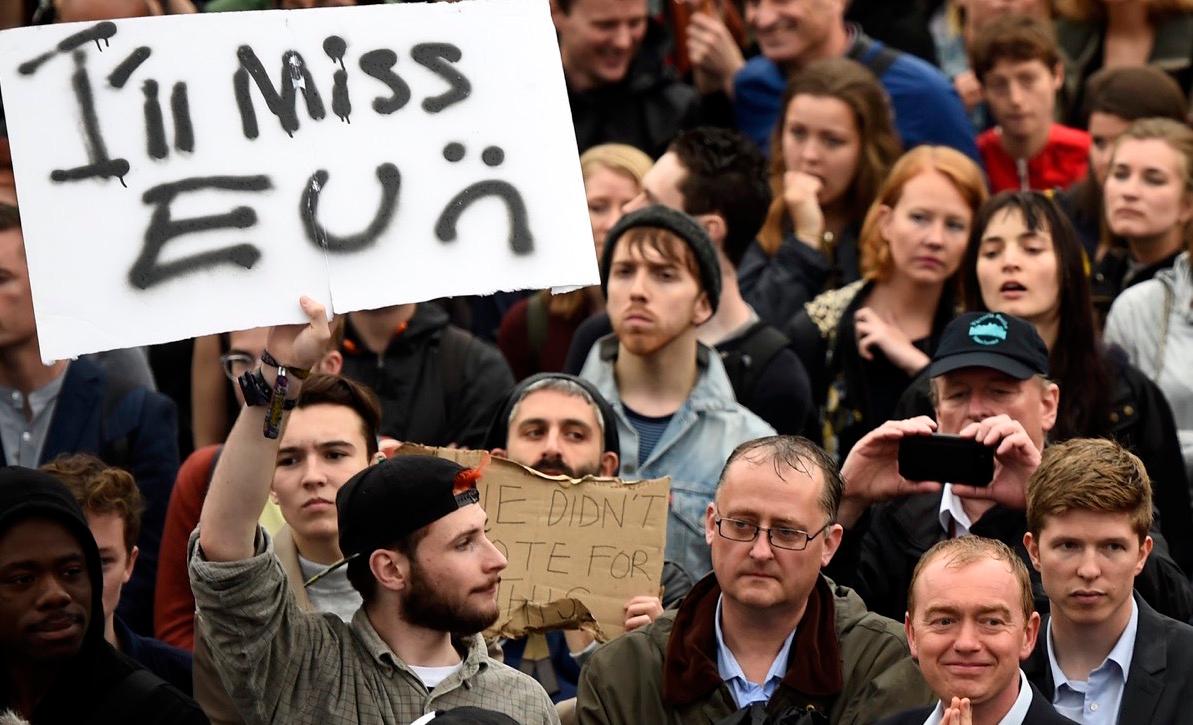I’m British and Spanish. I feel kicked out of myself.
Demonstrators take part in a protest on Tuesday aimed at showing London's solidarity with the European Union after the UK voted to dump the club.
On Friday I awoke to a swift punch to the stomach. The assault had flown all the way from Britain to land in my unsuspecting gut in Barcelona.
I had gone to sleep the night before quite confident that sanity would prevail and the status quo would be maintained. But as the UK’s European Union referendum result sank in, my depression worsened. It was a hangover but with no booze, a sense of bewilderment that I soon found out was shared by most of my family.
Let me explain: I was born in 1973, the son of a Spanish father and an English mother. Two years later, Spanish dictator Franco died and the UK joined the European Economic Community — an ancestor of the EU.
It would take another 11 years before Spain was welcomed into the European club.
On a personal level, being a mongrel of two different cultures basically means you have to behave like a divorced child: mentally defending the absent parent even when you know they’re partially guilty. In other words, being called “inglesito de mierda” (“shitty little English kid”) in the Spanish playground or getting told to “f— off back home!” on the streets of England when spending holidays with my grandparents.
This was Spain: a new democracy, lots of old fascists, a crumbling economy and, in my eyes, a cultural desert. For me, Spain was a country full of angry men who were afraid of change, always with a hint of violence if things didn’t go their way. What was there not to like?
England was something else. The yobs who had so adroitly invited me to leave their country were present in all my visits to my mum’s homeland, but their presence was balanced with the wonderful things I discovered in the UK. A sense of humor, a capacity for real debate, a sense of civic duty and groundbreaking television (plus, their TV was and still is commercial free!) These were all commodities that could not be found in even the shadiest black market in Spain. (Remember, this was eons before the internet blew our minds.)
So it was quite natural that I drifted toward anglophilia. I set out to collect English literature, TV, cinema, anything to line the dreariness of my Spanish education.
As I visited England over the years, I tried not to notice the other half of my other half: hooligans, vandalized train stations, proudly pregnant teenage girls, an aggressive undercurrent that was present in any British night out.
It was quite a long time before I started hearing about euroskepticism. I think it wasn’t until the late Margaret Thatcher years, or possibly under her successor John Major, that I first heard people from their Conservative Party raging against a bureaucratic monster named Brussels. That was absolutely baffling from my perspective. Joining the European Economic Community, in 1986, was a moment of national relief in Spain, one of the few moments when we believed that we could hold our head high when visiting our northern neighbors.
The Spanish economy has grown considerably over the past 30 years. And Europe has played an important part. But we could not help ourselves. There was a reckless use of European tax money for ridiculous projects throughout Spain. When the economic crisis hit Europe, it didn’t take long for northern countries — the UK very much included — to inspect more carefully the way their money was being invested in the south.
This climate was something I noticed when visiting England. And I found myself apologizing for things that had nothing to do with me and didn’t benefit me at all. Even if there was general commiseration, it wasn’t difficult to perceive that patience was running thin. So thin, in fact, that what I initially thought of as a vague electoral promise finally came to be: Britain would vote on remaining in the EU.
And back to Friday, to the rude awakening. To be honest, I surprised even myself with the wave of sadness that I felt upon learning about the results. In a strange game of halves, Britain (or rather, England and Wales) had reared its ugly, xenophobic head and it had devoured the gentleman’s head it shared a body with. This led me to feel disconnected with what I had always considered to be my better, civilized half. It was always comforting to think that I could escape to the UK if Spain became particularly unbearable; now it turns out that the UK has escaped from me.
Victor Lloret Blackburn is deputy editor of National Geographic History. He's based in Barcelona.
